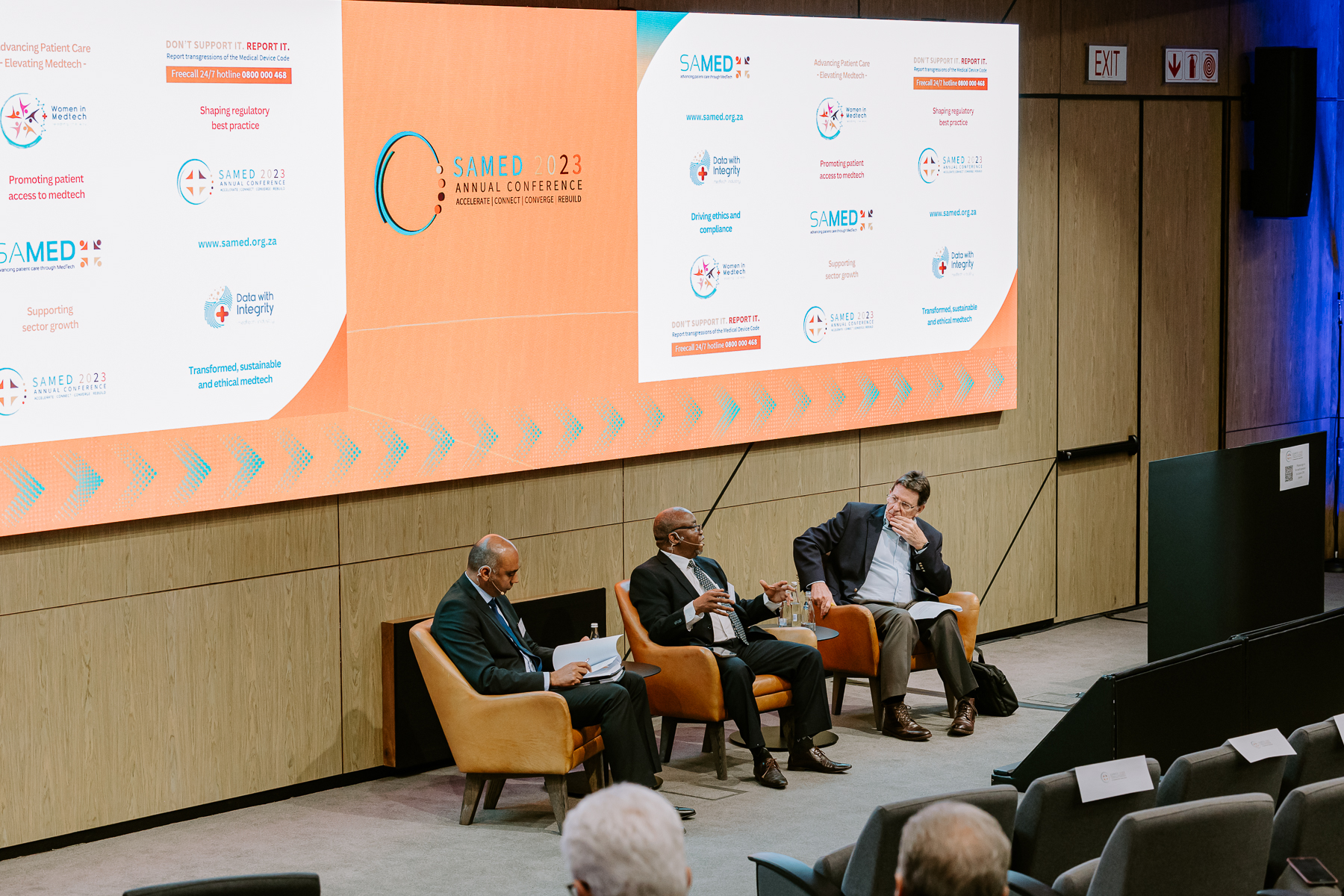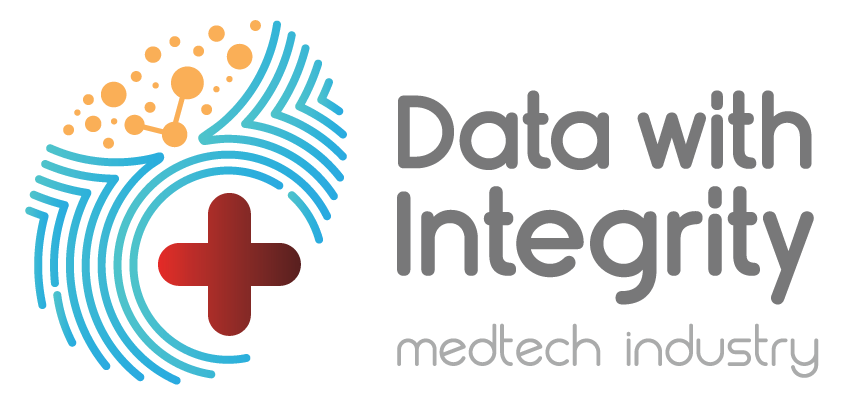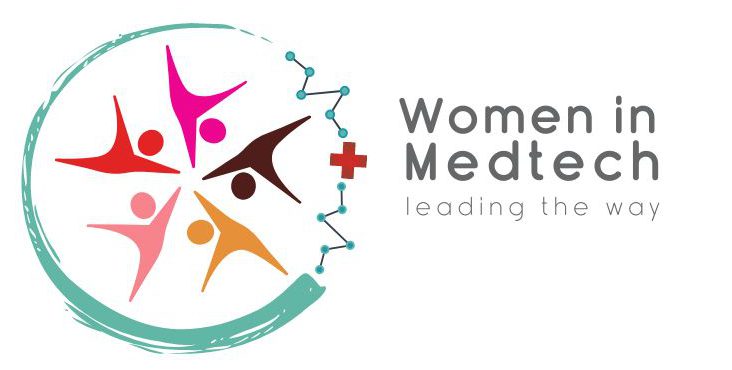SAMED 2023 annual conference highlights reel
Our annual conference, which took place at Deloitte in Waterfall City on 12 and 13 September was held under the theme Accelerate | Connect | Converge | Rebuild.
This rallying call captured SAMED’s drive to elevate our industry and power up stakeholders with an accelerated shared purpose to promote a sustainable, diverse, equitable, inclusive, and socially responsible medtech sector.
Industry experts, presenters and delegates eagerly participated in discussions that examined medtech in the context of patient access, harmonised regulations, digital healthcare and the future direction of South African healthcare. As in the previous years, our flagship annual gathering helped to foster partnerships and collaborations and enable frank deliberations on challenges and opportunities in the medtech sector.
NHI Bill a common thread
While noting that NHI has areas with potential for the medtech value chain, the delegates viewed the Bill’s preoccupation with the least possible cost as a significant risk to innovation and improved product and treatment access. Sustainable funding, purchasing models, transparency and governance are the primary areas of concern for the industry and civil society – yet clarity on these matters is still lacking.
The delegates thought that the single purchaser model potentially presents risks for large-scale corruption, such as incidents faced by other state-owned entities. To succeed, the universal healthcare framework should encompass public-private partnerships, processes for the co-creation of regulations, digital health and impeccable systems for cyber security.
The scourge of corruption
The complex battle against corruption is a real concern for the industry’s sustainability, for patient care and for the implementation of NHI. No single party can be a sole solution to the corruption crisis. Government, business, healthcare providers and the civil society will need to collaborate to root out corruption and minimise its detrimental impact on health services and patient outcomes.
Without ethical, conscientious and bold leaders along with robust checks and balances that can call everyone implicated in corruption and mismanagement to account, corruption will remain a danger for the health system.
Regulations, convergence and certification
Practical ways should be found to strengthen the understanding of the current regulatory landscape among members. Recommendations by participants included practical knowledge sharing and a revision of existing resources aimed at supporting industry while being compliant with regulations.
This fed into a discussion on advancing convergence to accelerate access and strengthen regulatory capacity for global oversight. Local and international practitioners presented on best practices, the logic behind harmonisation being in the interest of patients and strategies for co-designing fit-for-purpose regulations.
Changes to the nursing practice that will determine how medtech companies contract with private nurse practitioners were discussed in relation to professional nurse shortages, which are likely to deepen due to expected retirement of many registered nurses over the next decade.
An in-depth impact analysis should be conducted by the relevant parties before regulations are imposed to ensure that onerous regulatory oversight does not compromise access and patient care.
The approaching ISO 13485 requirements that cover medtech suppliers’ operations regarding system management, risk analysis and quality control, will afford greater surety to the regulator.
- Companies that are yet to implement ISO 13485 should start to gather the necessary data and develop their processes to be able to meet audit and certification deadlines.
- Having several local notification bodies accredited by SANAS to audit medtech companies to ISO 13485 certification has increased pricing competitiveness, although capacity for audits remains limited. Given that many suppliers still need to go through this process raised concerns about possible disruptions in access to products and services if medtech companies miss the deadline. SAMED plans to expand ISO 13485 training opportunities for both the SAMED team as well negotiate rates for members to help them meet the timelines.
- SAMED Data with Integrity project will collect information on the members’ regulatory status and the anticipated impact that the accreditation, regulatory changes and the proposed product registration fees will have on their operational sustainability, particularly among SMMEs and start-ups.
SAMED 2023 annual conference snapshot
![]() 1.5 days
1.5 days
![]() 19 sessions
19 sessions
![]() 62 panellists and speakers
62 panellists and speakers
- 58% non-white
- 47% female
![]() Attendance: 121 in-person and 23 virtual
Attendance: 121 in-person and 23 virtual
Supply and procurement
The delegates agreed that a move from the traditional medtech volume/price-based procurement and reimbursement to value-based models was necessary. However, this also requires cooperation between role players so that the transition balances medtech sustainability with the needs of the health system and affordability of patient care. Core considerations related to this aspect of the medtech supply chain were the rising import and logistics costs and safeguards to preserve a continuum of care.
Delegates and experts deliberated on the factors that contribute to the quality and effectiveness of health services. Developing robust contingency solutions that are aligned to social and policy requirements will assist in building resilient, sustainable and transparent supply chains under the constrained infrastructural and other resource-related conditions.
Hot topics for 2024: ESG, localisation and international trade
As is the case with other industries, our sector has to evolve to meet expectations of the healthcare system to serve patients as well as the planet and society. Experts shared their views on how medtech should go about meeting its environment/society/governance (ESG) responsibilities. Extended producer responsibility (EPR), circular economy, designing and manufacturing for reduced carbon emissions, along with diversity, equity, and inclusion will be hot topics we have to tackle in the short-term.
It was apparent that we needed a clear strategy that will encourage and nurture local manufacturing – with the promise of success if we can capitalise on trade agreements including those under BRICS, AGOA and AfCFTA. South Africa is a prime hub for trade into the rest of the continent. A well-constructed policy that truly unlocks local manufacture and takes it to the next level would benefit the sustainability of the medtech industry, our patients’ access to health products and South Africa’s economy through employment and exports.
One pertinent area would be bioplastics. Single use devices end up either in the landfill or in incinerators where they emit harmful chemicals when burned. Bioplastics applied in a medtech context can help alleviate this impact.
There was significant interest to match up established multinational and large medtech companies with local manufacturers with capacity or infrastructure to accelerate implementation. Quick wins could secure greater goodwill and interest among government, policy makers and investors interest to secure additional investment necessary for overcoming policy limitations and other barriers to market. Government support could include an increased focus on procuring local content within the public health sector as part of procurement goals.
Several partners and support services can help those interested in localisation. For further information on accessing these resources, CLICK HERE.
As part of the continually evolving procurement systems, the government is setting specific goals for procurement by SOEs and state-run organisations. The focus is on procuring from:
- Entities owned/run by women, youth and disabled people.
- Ecologically certified suppliers.
- Locally available content and production.
SAMED has placed significant efforts into raising the profile of women in medtech. We have designed key metrics, in the form of a Women Empowerment Index which will be an element of Data with Integrity, to be used to evaluate the industry’s current performance and plans that will in time lift more women in our industry to leadership and other critical roles.
It is vital for SAMED members to continue to support various SAMED or other initiatives that are helping to expand core medtech skills, including manufacturing, regulatory, quality management, reimbursement and health technology assessments. The health products regulatory affairs assistant qualification development that is underway, the YES programme and other available trainings were highlighted as vehicles to build capacity and a talent pipeline.
The process of health technology assessments (HTAs) can support decisions relating to benefit package design and service coverage both within medical schemes and the NHI. HTA involves institutional cooperation with agreed methods and procedural standards. HTA awareness remains low, and HTA-related activities are uncoordinated and often disconnected from policy. In this session experts, shared best practices for compile real world evidence and how to best conduct HTAs in the context of funder needs and future NHI systems.





